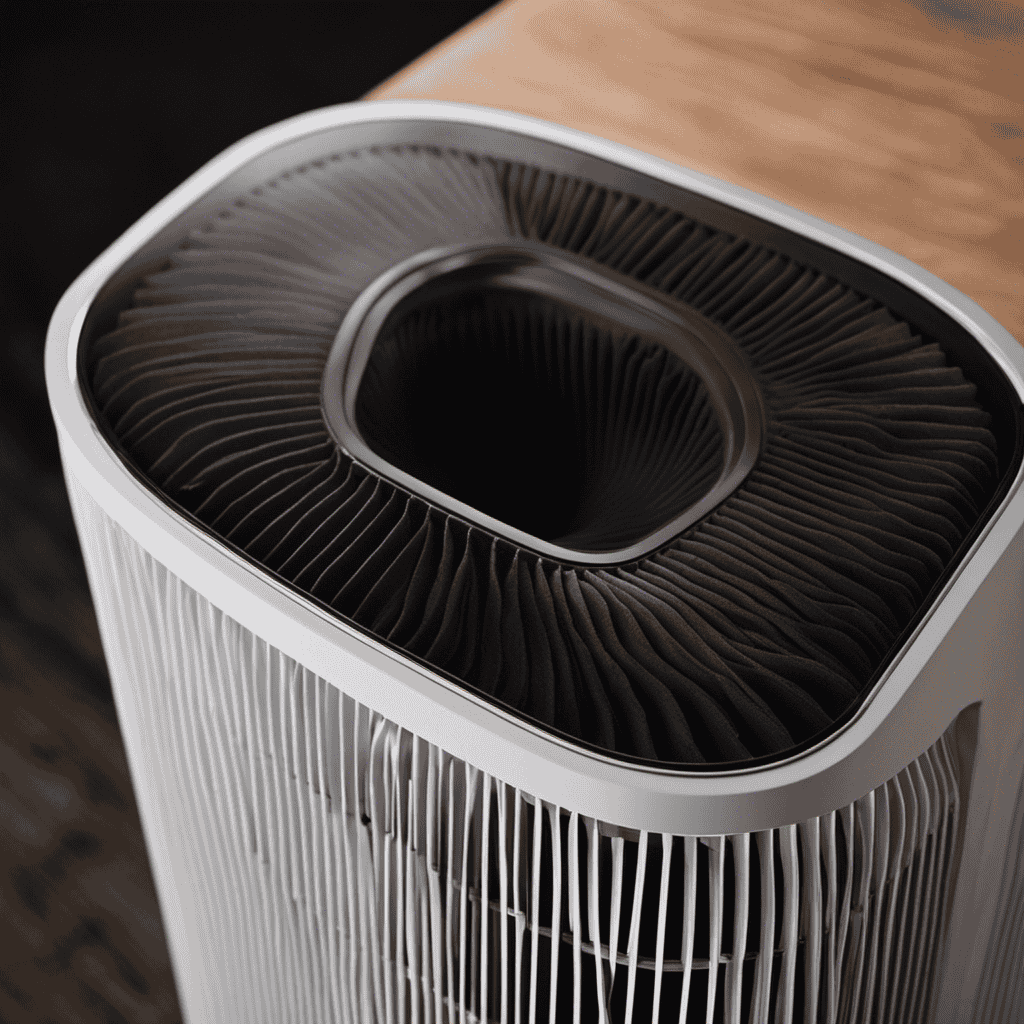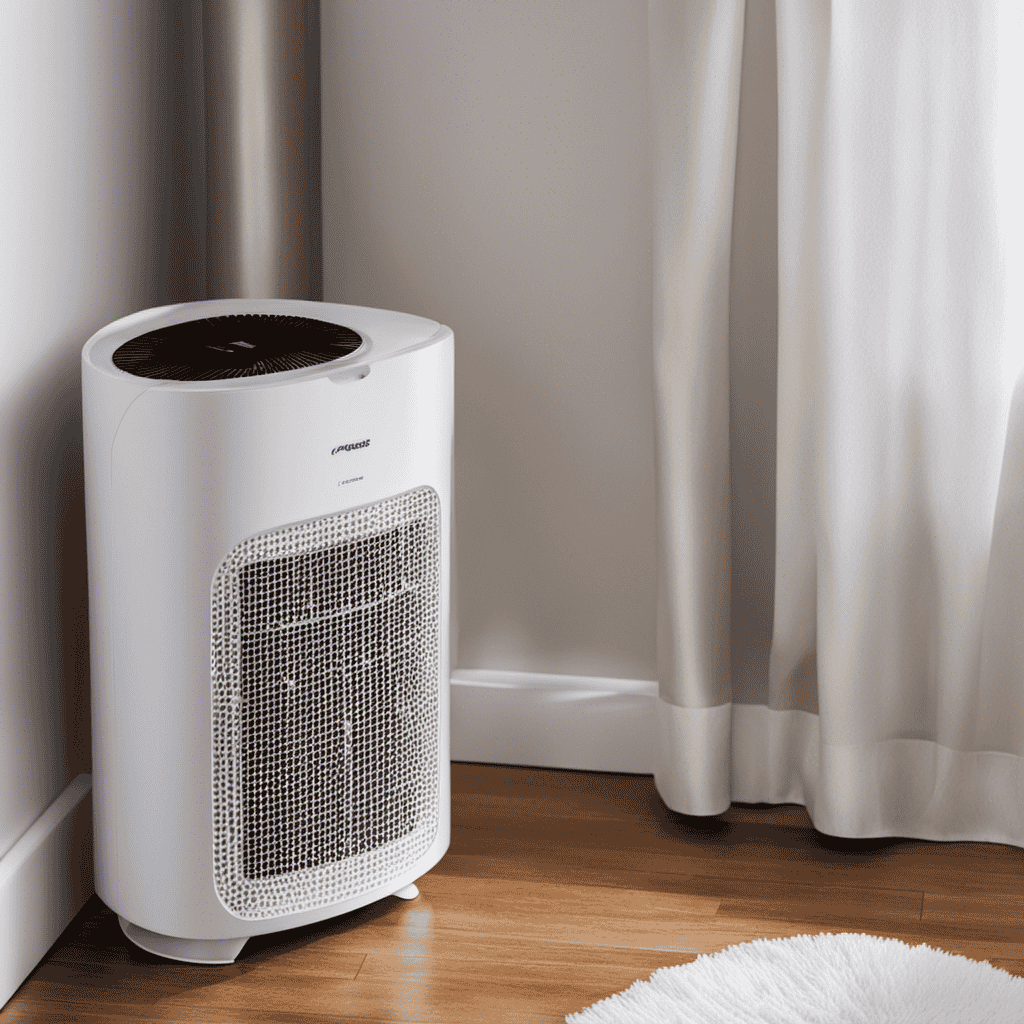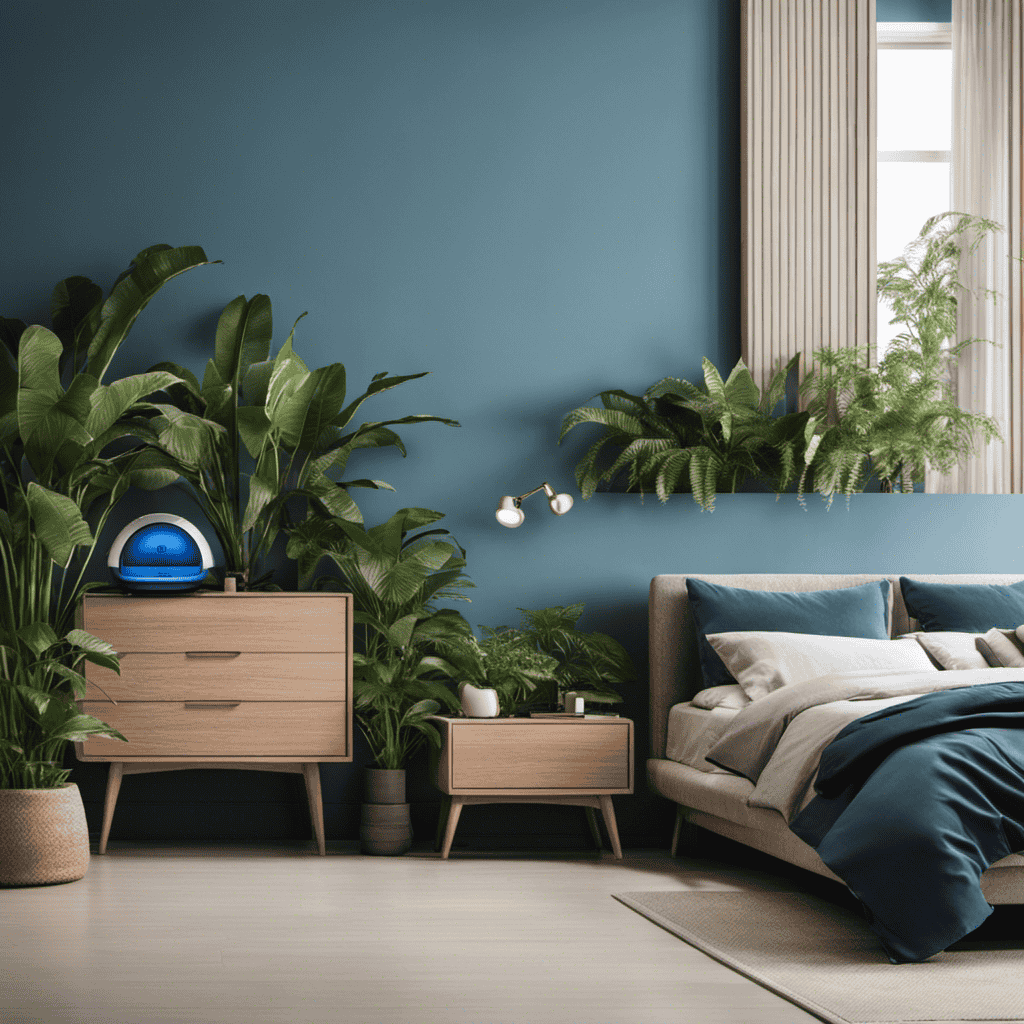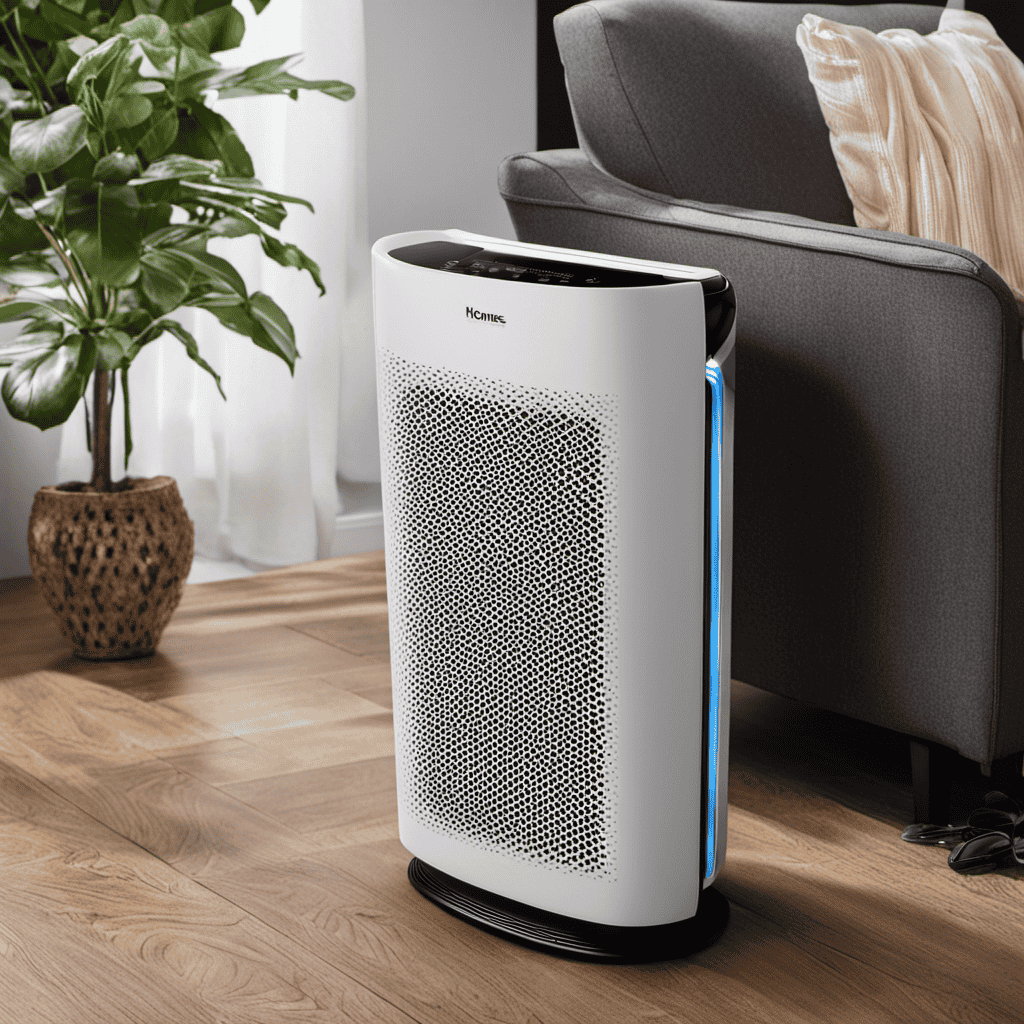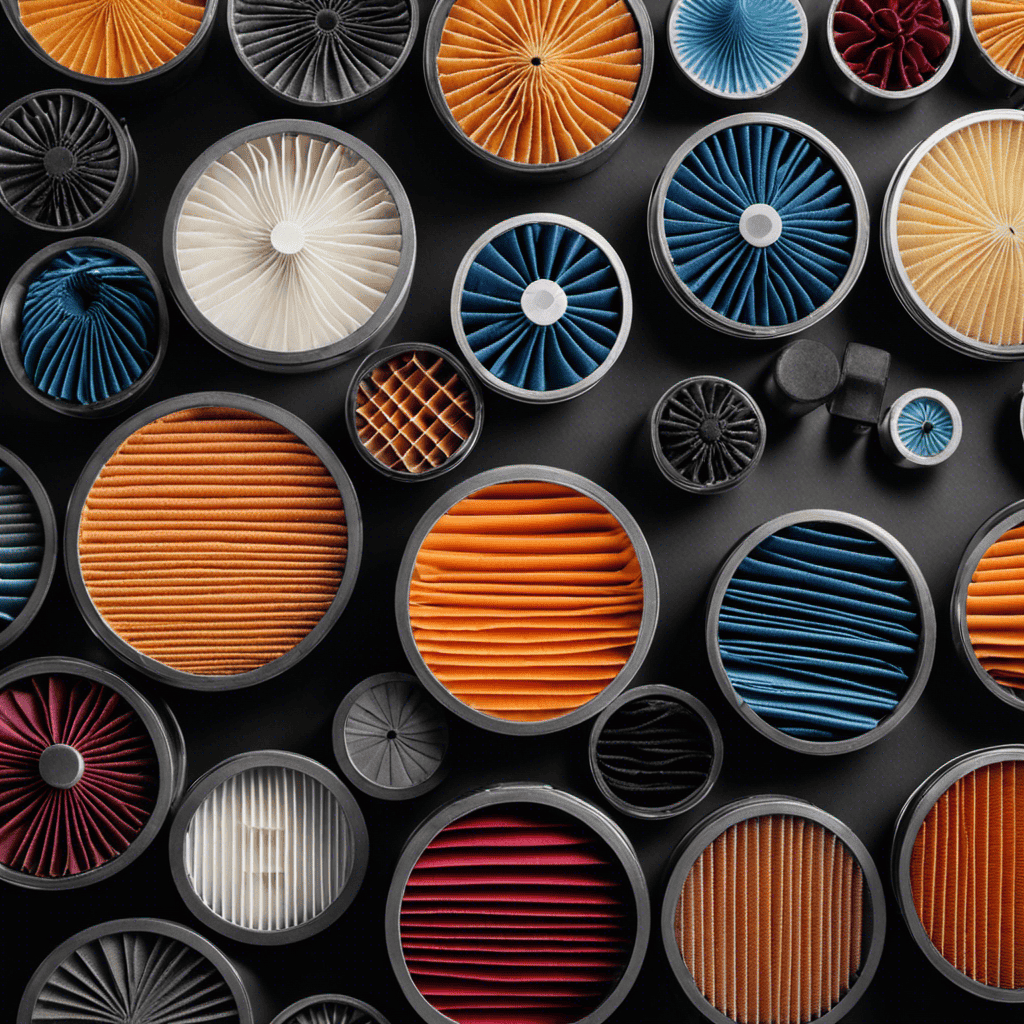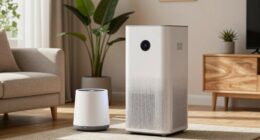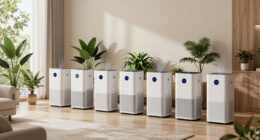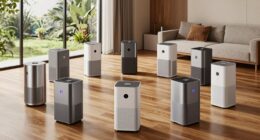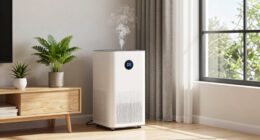Do you want to know the true effectiveness of an ion air purifier? I have all the answers for you!
In this article, I’ll delve into the science behind ion air purifiers and explore their benefits. We’ll also take a closer look at the ionization process and compare them to other types of air purifiers.
Additionally, I’ll discuss their effectiveness in removing pollutants and highlight any potential drawbacks.
Stay tuned to learn some valuable tips for choosing the right ion air purifier for your needs.
Key Takeaways
- Ion air purifiers effectively remove airborne particles and allergens.
- Ionization helps neutralize harmful bacteria and viruses in the air.
- The release of negative ions from ion air purifiers can improve mood and reduce stress.
- Regular cleaning and proper ventilation should be maintained for optimal results with ion air purifiers.
The Science Behind Ion Air Purifiers
Ion air purifiers use charged particles to attract and remove pollutants from the air. This technology, known as negative ionization, works by emitting negatively charged ions into the air.
These ions attach themselves to positively charged particles, such as dust, pollen, and pet dander. Once the particles are ionized, they become heavier and fall to the ground or are captured by the purifier’s collection plates.
This process effectively reduces the number of airborne particles, improving the air quality in your home. Research has shown that negative ions have additional benefits, such as improving mood and reducing stress.
These ions can also help to neutralize harmful bacteria and viruses in the air. With these benefits, it’s clear that using an ion air purifier can have a positive impact on your overall well-being and health.
Benefits of Using an Ion Air Purifier
There are several advantages to using an ion air purifier in your home. Not only do they effectively remove airborne particles and allergens, but they also have a number of other benefits. One advantage is their comparison with HEPA filters. While both types of air purifiers can effectively clean the air, ionizers have the added benefit of not requiring filter replacements. This makes them more cost-effective in the long term, as you won’t have to continually purchase new filters. Additionally, ion air purifiers are known to release negative ions into the air, which can help improve mood and overall well-being. With their ability to remove pollutants and provide long-term cost effectiveness, ion air purifiers are a great choice for improving the air quality in your home.
| Advantages of Ion Air Purifiers | ||
|---|---|---|
| Effectively remove airborne particles and allergens | Comparison with HEPA filters | Long-term cost effectiveness |
Understanding the Ionization Process
I’ve always been curious about the relationship between ionization and air quality, especially when it comes to the benefits of ion purifiers.
From what I’ve researched, ionization is a process where ions are generated and released into the air. This process can help improve air quality by neutralizing harmful pollutants.
These ion purifiers claim to have numerous benefits. They include the ability to remove allergens, bacteria, and odors from the air. This makes the air cleaner and healthier to breathe.
Ionization and Air Quality
You might be wondering how ionization affects the quality of the air around you. Well, let me explain.
Here are four ways ionization can improve air quality and provide health benefits:
-
Reduction of airborne particles: Ionization helps to attract and remove airborne particles such as dust, pollen, pet dander, and mold spores from the air, thereby reducing allergens and improving respiratory health.
-
Elimination of odors: Ionizers can also neutralize odors by breaking down and removing odor-causing molecules from the air, leaving your space smelling fresh and clean.
-
Reduction of bacteria and viruses: The ionization process can help to deactivate and eliminate harmful bacteria and viruses in the air, reducing the risk of airborne diseases and infections.
-
Improved mood and mental clarity: Negative ions produced by ionizers have been shown to increase serotonin levels in the brain, which can enhance mood, reduce stress, and improve mental clarity.
Overall, the ionization process in air purifiers can greatly contribute to better air quality and provide various health benefits for individuals.
Benefits of Ion Purifiers
If you’re looking for a way to improve the quality of the air around you, using an ion purifier can offer several benefits.
Ion purifiers work by releasing negatively charged ions into the air, which attach to positively charged particles like dust, pollen, and pet dander. These particles then become heavy and fall to the ground, reducing their presence in the air you breathe.
This can be especially helpful for people with allergies, as it can help to alleviate symptoms by removing allergens from the indoor environment.
Additionally, ion purifiers can also help to reduce indoor pollutants such as smoke, odors, and bacteria.
It’s important to note that while ion purifiers can be effective in improving air quality, they should be used in conjunction with other measures such as regular cleaning and proper ventilation for optimal results.
Comparing Ion Air Purifiers to Other Types
When comparing ion air purifiers to other types, it’s important to consider their effectiveness and long-term costs. Here are some advantages and disadvantages to keep in mind:
Advantages:
- Ion air purifiers can effectively remove pollutants such as dust, pollen, and pet dander from the air.
- They can help reduce odors and improve the overall air quality in your home.
- Ion air purifiers are often compact and portable, making them easy to move around and use in different rooms.
- Some models also have additional features like built-in filters or UV lights for enhanced purification.
Disadvantages:
- Ion air purifiers may produce ozone as a byproduct, which can be harmful to individuals with respiratory conditions.
- They may not be as effective in removing larger particles or certain types of contaminants.
- Ion air purifiers require regular maintenance, including cleaning the plates or filters, to ensure optimal performance.
- The initial cost and ongoing electricity usage of ion air purifiers can be higher compared to other types of air purifiers.
Overall, it’s essential to weigh the pros and cons of ion air purifiers before making a decision.
Effectiveness of Ion Air Purifiers in Removing Pollutants
The effectiveness of ion air purifiers in removing pollutants can vary depending on the specific model and its features. Ion air purifiers work by emitting negatively charged ions into the air, which attach to airborne particles and cause them to fall to the ground or adhere to surfaces. While this can help to reduce allergens such as pollen, dust, and pet dander, the effectiveness may be limited in larger spaces or areas with high levels of pollutants.
Additionally, ion air purifiers do not remove gases or odors from the air. It is important to note that there is limited scientific evidence on the long-term health effects of using ion air purifiers. Some studies suggest that the production of ozone by certain models may have adverse effects on respiratory health.
Transitioning to the next section, it is necessary to consider the potential drawbacks of ion air purifiers.
Potential Drawbacks of Ion Air Purifiers
When it comes to ion air purifiers, there are some potential drawbacks that need to be considered.
One concern is the production of ozone, which can be harmful to human health and the environment.
Another drawback is the limited effectiveness of these purifiers in removing particles, as they primarily focus on ionizing the air rather than physically capturing pollutants.
These factors highlight the need for careful consideration when choosing an air purifier to ensure both effective particle removal and ozone safety.
Ozone Production Concerns
If you’re concerned about ozone production, you should know that ion air purifiers can sometimes release small amounts of ozone into the air. While the ozone emissions from these devices are generally low, there are still some health concerns associated with it. Here are some points to consider:
-
Ozone emission risks: Ion air purifiers use electrical charges to remove particles from the air. This process can produce ozone as a byproduct. Although the levels are usually within safe limits, prolonged exposure to elevated ozone levels can lead to respiratory issues and worsen existing respiratory conditions.
-
Health concerns: Some individuals, particularly those with asthma or other respiratory conditions, may be more sensitive to ozone exposure. High levels of ozone can irritate the lungs, trigger asthma attacks, and cause respiratory symptoms such as coughing and shortness of breath.
-
Regulatory standards: Various organizations have established limits on ozone emissions from air purifiers. It is essential to choose a device that meets these standards to minimize potential health risks.
-
Mitigation measures: To reduce ozone emissions, look for ion air purifiers with low ozone emission levels, choose models that incorporate ozone sensors and automatic shut-off features, and ensure proper ventilation in the room where the purifier is used.
While ion air purifiers can be effective in improving indoor air quality, it is crucial to consider the potential ozone emission risks and take appropriate measures to mitigate them.
Limited Particle Removal
One drawback of ion purifiers is that they may not effectively remove all particles from the air. While ion purifiers use ionization to charge particles and attract them to surfaces, they do not have a dedicated particle filtration system.
This means that larger particles, such as dust and pollen, may not be effectively captured and removed from the air. Other air purification techniques, such as HEPA filters, are specifically designed to filter out particles of various sizes.
HEPA filters have been proven to remove 99.97% of particles as small as 0.3 microns from the air. Therefore, if particle removal is a top priority, it may be more effective to consider air purifiers with dedicated particle filtration systems, such as those using HEPA filters.
Tips for Choosing the Right Ion Air Purifier
To choose the right ion air purifier, there are a few key factors to consider.
First, think about the size of the room you want to purify. Determine the square footage and look for an ion air purifier that is designed to effectively clean the air in that size space.
Next, pay attention to the CADR ratings of different models. CADR stands for Clean Air Delivery Rate and it indicates how quickly the purifier can remove pollutants like dust, pollen, and smoke from the air. Look for ion air purifiers with high CADR ratings for maximum effectiveness.
Consider the type of filter used in the ion air purifier. HEPA filters are highly effective at capturing small particles, while activated carbon filters can help remove odors and chemicals. Think about your specific needs and choose a filter type that will address them.
Check the maintenance requirements of the ion air purifier as well. Look for models with easy-to-replace filters and clear instructions on how often they need to be changed. This will ensure that your purifier continues to work effectively over time.
Frequently Asked Questions
How Much Electricity Does an Ion Air Purifier Consume?
An ion air purifier consumes minimal electricity while still being effective in improving air quality. It efficiently removes airborne particles by emitting negative ions that attract and neutralize pollutants, providing cleaner and healthier indoor air.
Can Ion Air Purifiers Eliminate Pet Dander and Pet Odors?
I’ve tried using an ion air purifier to eliminate pet dander and odors, but it wasn’t effective. HEPA filters, on the other hand, did a much better job.
Are Ion Air Purifiers Safe for Individuals With Respiratory Conditions Such as Asthma or Allergies?
Ion air purifiers can be effective in reducing indoor pollutants, but they may not be the best option for individuals with respiratory conditions like asthma or allergies. HEPA filters are generally considered safer and more reliable.
Do Ion Air Purifiers Require Regular Maintenance or Filter Replacements?
Regular maintenance and filter replacements are necessary for the optimal performance of ion air purifiers. It ensures that the purifier continues to effectively remove pollutants from the air, promoting a cleaner and healthier environment.
Can Ion Air Purifiers Remove Viruses and Bacteria From the Air?
Ion air purifiers can effectively remove viruses and bacteria from the air. They have been shown to improve air quality and provide health benefits by reducing airborne contaminants.
Conclusion
In conclusion, after delving into the science and benefits of ion air purifiers, it’s evident that they can be a valuable addition to one’s indoor environment.
Like a knight in shining armor, these purifiers use the power of ions to combat pollutants and provide cleaner air.
However, it’s important to consider their limitations, such as their inability to remove larger particles.
By carefully selecting the right ion air purifier, one can enjoy the advantages they offer and breathe easier in their own kingdom.

